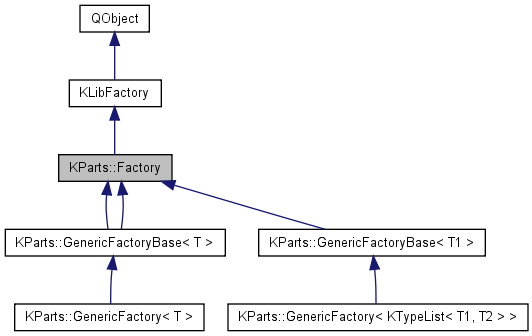KParts
KParts::Factory Class Reference
A generic factory object to create a Part. More...
#include <factory.h>

Classes | |
| struct | QueryInstanceParams |
Public Member Functions | |
| Part * | createPart (QWidget *parentWidget=0, const char *widgetName=0, QObject *parent=0, const char *name=0, const char *classname="KParts::Part", const QStringList &args=QStringList()) |
| Factory (QObject *parent=0, const char *name=0) | |
| const KInstance * | partInstance () |
| virtual | ~Factory () |
Static Public Member Functions | |
| static const KInstance * | partInstanceFromLibrary (const QCString &libraryName) |
Protected Types | |
| enum | { VIRTUAL_QUERY_INSTANCE_PARAMS = 0x10 } |
Protected Member Functions | |
| virtual QObject * | createObject (QObject *parent=0, const char *name=0, const char *classname="QObject", const QStringList &args=QStringList()) |
| virtual Part * | createPartObject (QWidget *parentWidget=0, const char *widgetName=0, QObject *parent=0, const char *name=0, const char *classname="KParts::Part", const QStringList &args=QStringList())=0 |
Detailed Description
A generic factory object to create a Part.Factory is an abstract class. Reimplement the createPartObject() method to give it functionality.
- See also:
- KLibFactory.
Definition at line 40 of file factory.h.
Member Enumeration Documentation
anonymous enum [protected] |
Constructor & Destructor Documentation
| Factory::Factory | ( | QObject * | parent = 0, |
|
| const char * | name = 0 | |||
| ) |
Definition at line 33 of file factory.cpp.
| Factory::~Factory | ( | ) | [virtual] |
Definition at line 38 of file factory.cpp.
Member Function Documentation
| QObject * Factory::createObject | ( | QObject * | parent = 0, |
|
| const char * | name = 0, |
|||
| const char * | classname = "QObject", |
|||
| const QStringList & | args = QStringList() | |||
| ) | [protected, virtual] |
Reimplemented from KLibFactory.
Calls createPart()
Implements KLibFactory.
Definition at line 77 of file factory.cpp.
| Part * Factory::createPart | ( | QWidget * | parentWidget = 0, |
|
| const char * | widgetName = 0, |
|||
| QObject * | parent = 0, |
|||
| const char * | name = 0, |
|||
| const char * | classname = "KParts::Part", |
|||
| const QStringList & | args = QStringList() | |||
| ) |
Creates a part.
The QStringList can be used to pass additional arguments to the part. If the part needs additional arguments, it should take them as name="value" pairs. This is the way additional arguments will get passed to the part from eg. khtml. You can for example embed the part into HTML by using the following code:
<object type="my_mimetype" data="url_to_my_data"> <param name="name1" value="value1"> <param name="name2" value="value2"> </object>
createPart( parentWidget, name, parentObject, parentName, "KParts::Part", QStringList("name1="value1"", "name2="value2") );
- Returns:
- the newly created part.
Definition at line 42 of file factory.cpp.
| Part * Factory::createPartObject | ( | QWidget * | parentWidget = 0, |
|
| const char * | widgetName = 0, |
|||
| QObject * | parent = 0, |
|||
| const char * | name = 0, |
|||
| const char * | classname = "KParts::Part", |
|||
| const QStringList & | args = QStringList() | |||
| ) | [protected, pure virtual] |
Reimplement this method in your implementation to create the Part.
The QStringList can be used to pass additional arguments to the part. If the part needs additional arguments, it should take them as name="value" pairs. This is the way additional arguments will get passed to the part from eg. khtml. You can for example emebed the part into HTML by using the following code:
<object type="my_mimetype" data="url_to_my_data"> <param name="name1" value="value1"> <param name="name2" value="value2"> </object>
createPart( parentWidget, name, parentObject, parentName, "Kparts::Part", QStringList("name1="value1"", "name2="value2") );
- Returns:
- the newly created part.
Implemented in KParts::GenericFactory< T >, and KParts::GenericFactory< KTypeList< T1, T2 > >.
Definition at line 72 of file factory.cpp.
| const KInstance * Factory::partInstance | ( | ) |
If you have a part contained in a shared library you might want to query for meta-information like the about-data, or the KInstance in general.
If the part is exported using KParts::GenericFactory then this method will return the instance that belongs to the part without the need to instantiate the part component.
Definition at line 50 of file factory.cpp.
A convenience method for partInstance() that takes care of retrieving the factory for a given library name and calling partInstance() on it.
- Parameters:
-
libraryName name of the library to query the instance from
Definition at line 58 of file factory.cpp.
The documentation for this class was generated from the following files:
 KDE 3.5 API Reference
KDE 3.5 API Reference